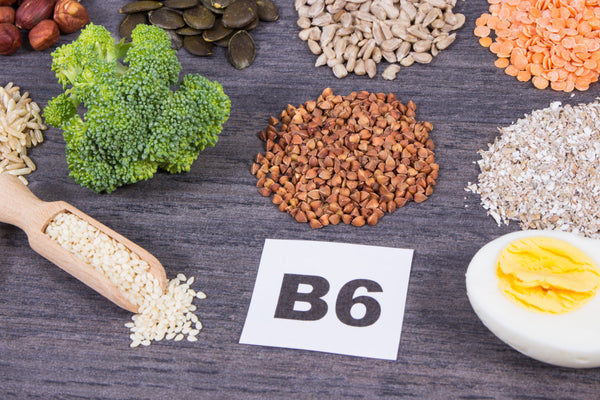
How Much Protein Intake Per Day?

For people looking to increase their immune system and maintain a healthy weight, one of the most common questions they have is, “How much protein intake per day?”
Of course, it's different for everyone. For measurable results, you may need to consult a healthcare provider.
Protein is one of the three essential macronutrients. Food provides us with amino acids, the building blocks of protein, which have many benefits for healthy body functions.
How much protein you need per day depends on factors such as your body size and your activity level.
Below we'll look at protein requirements by goal; including weight management, muscle building, and general health maintenance into old age.
Why is Protein Important?

You may be eating protein with the goal of building lean muscle tissue. More than that, protein also has many other important roles. For example, the health of organs, cells, and tissues that need protein to function properly.
We need it to manage muscle and burn fat, support metabolism, and even to promote the health of certain organs and glands, such as the thyroid and adrenal glands.
In other words, we need protein in general, active and healthy.
These macronutrients also help with overall health, so when you are very active or exercise a lot, you usually need more protein during this time.
Your Daily Protein Intake Needs
To determine how many grams of protein per day you need, let's break it down into three categories:
- How much protein do you need on a regular basis to promote overall health?
- How much protein do you need to help manage a healthy weight and/or burn fat?
- How much protein do you need to build muscle per day?
General Daily Protein Intake
If your goal is to maintain health, mobility, and general health as you age, then, for most people, you can consume about 50 percent of your body weight in grams of protein per day.
Say you weigh 160 pounds (72 kg) and you want to be generally healthy, you can consume about 36 grams of protein per day from your diet.
Therefore, if you eat three meals a day, you will get about 25 grams of protein per meal.
Second, let's say you're trying to maintain a healthy weight, and you're looking for the right fat-burning foods.
It's a good idea to focus on having large amounts of protein, as protein has been shown to be filling and help control appetite.
Having about 0.75 grams of protein a day per pound of body weight can help replace some of the extra carbohydrates and sugars in your diet, providing a feeling of fullness throughout the day.
Furthermore, if you weigh 160 pounds, multiply that number by 0.75. You can eat almost 100 or 120 grams of protein a day if you're trying to help manage a healthy weight and/or lose body fat.
This means that if you eat four meals a day, you will need 25 to 30 grams of protein at each meal.
Protein Requirements by Age The
Recommended Dietary Allowance (RDA) of protein, by age, is as follows:
- Ages 9–13 years — 34 grams/day
- Ages 14–18 (women) — 46 grams/day
- Ages 14–18 (men) — 52 grams/day
- Ages 19–70+ (women) — 46 grams/day
- Ages 19—70+ (men) — 56 grams/day
Protein for Muscle Building
What if very active — how much protein do you need per day to help build muscle?
If trying to gain muscle and strength, measure your weight and eat about that number of grams of protein per day.
That means, if you weigh 160 pounds (72 kg) and want to gain muscle mass, you should try to eat about 160 grams of protein a day.
If you eat more than four times a day, that means there are 40 grams of protein per meal. (That's why protein shakes are one of the snacks for muscle building.)
Again, because everyone is different, you should always consult a healthcare professional about the right amount of protein intake.
How to Calculate Protein Intake Per Day
Want to know, How do you calculate how much protein your body needs?
- First determine your weight on an empty stomach without clothes (can be practiced in the morning).
- Divide your body weight in half for protein intake. Eat that amount in grams of protein per day.
- Multiply your weight by 0.75 if you are trying to maintain a healthy weight. Eat that amount in grams of protein per day.
- To gain weight and muscle, eat according to your current body weight in grams of protein per day.
- Overall, aim to get between 10 and 30 percent of your daily calories from protein; You'll probably need more for weight management and muscle building, and less if you're not very active.
In addition, you may also see recommendations based on weight in kilograms. For example, the general protein recommendation is at least 0.8 grams per kilogram of body weight.
See: Vitamin B5: Definition, Benefits, Food Sources
To convert your weight from pounds to kilograms, divide your weight in pounds by 2.2; So, 140 pounds is 64 kg. For general health purposes, at least 51 grams of protein would be recommended for someone of this size.
Best Protein Supplements
One of the easiest ways to increase your protein intake is to supplement with protein powders. Today there are so many types available, including from animal and plant sources.
What is the best protein powder? Some popular types include:
- Collagen
- Bone broth
- Casein
- Mixed vegetable protein (usually whole grains)
- Soy
- Rice
- Nuts
- Eggs
- Flax
Protein-Containing Foods
Some of the best protein sources include these healthy foods:
- Grass-fed beef Free-range
- chicken and turkey
- Eggs free-range chicken
- Fish; such as salmon and tuna
- Collagen protein powder
- Yogurt, kefir and cottage cheese
- Organic whole milk (ideally raw)
- For plant-based such as: nuts, legumes, whole grains (such as chickpeas, almonds, flaxseeds, flaxseeds and chia, black beans, quinoa, oats and organic tempeh)
While getting enough protein is very important, remember that variety and overall balance are key.
Try to eat a balanced diet with some vegetables, foods rich in fiber and healthy fats, such as nuts, seeds, olive oil, etc.
Excess Protein
What happens if you eat too much protein? People who want to manage weight or gain muscle may tend to eat too much protein and tend to overdo it and ignore other healthy foods.
Eating too much protein has the potential to cause side effects such as indigestion, constipation, bad breath, and sometimes kidney-related problems such as kidney stones.
Experts don't completely agree with consuming too much protein; however, it is generally best not to eat more grams than your current body weight in pounds.
Some suggest no more than 2 grams per kg of body weight, or about 145 grams/day for a 160-pound person.
That's the article Protein Intake Per Day. Hope it is useful.




